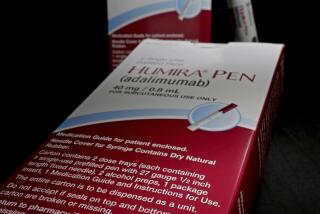With News of Its Arrangements With Other Firms, ICN Is in Spotlight Again
- Share via
Two developments last week refocused attention on ICN Pharmaceuticals, the Costa Mesa drug manufacturer with a controversial past and, according to some analysts, a promising future.
On Thursday, the company announced that it was taking full control of a joint research venture with Kodak to develop new drugs.
On Friday, ICN announced a licensing agreement involving new drugs developed by Hoffman-LaRoche, a Swiss pharmaceutical company, for the treatment of muscle atrophy. The agreement, which allows ICN to sell the drugs in the United States and Canada, could generate as much as $17 million in annual sales.
But it is ribavirin, an antiviral drug that ICN contends can be effective against the deadly AIDS virus, that many analysts and investors are pinning their biggest hopes on. But it is also ribavirin that has been the cause of the company’s past problems.
In the view of one analyst, the pressures of a presidential election year may provide the catalyst the company needs to win approval to market the drug as a treatment for acquired immune deficiency syndrome. In fact, ribavirin could be approved for use in hospitals as early as Nov. 8, said Eugene Melnitchenko, a securities analyst with Eppler, Guerin & Turner in Dallas.
OK Would Set Off ‘Fireworks’
“That would really cause some fireworks in the stock price,” Melnitchenko said.
ICN stock, which traded as high as $34 a share in July 1986, when approval of the drug seemed a near certainty, closed on Friday at $6, unchanged for the day.
Melnitchenko contends that Republican presidential nominee George Bush, who also serves as chairman of a presidential task force on regulatory reform, is pushing hard for the FDA to adopt new rules that would speed up the approval process for new drugs that would be used to treat critically ill patients.
By doing so, Bush could distance himself from charges that the Reagan Administration has not done enough to combat the AIDS problem.
“If (FDA) Commissioner (Frank) Young wants his job after the election,” the FDA will take action by November, Melnitchenko said.
High Priority Predicted
Ribavirin would be the “No. 1 candidate for expedited approval,” since extensive testing on the drug has already been completed, Melnitchenko said.
Before prospective investors get overly enthusiastic about this scenario, however, a little company history is worth remembering.
Over the past two years, FDA consideration of ribavirin as an AIDS treatment has become entangled in a sticky web of scientific and political posturing.
And ribavirin, which the company has promoted over the past 16 years as a treatment for maladies ranging from the common cold to old age, was at the center of several lawsuits in 1987 in which investors contended the company unfairly “hyped” the drug.
ICN Chairman Milan Panic said he could not comment on the prospects for FDA approval of ribavirin but said he believes in the drug as much today has he ever has.
Higher Profits Foreseen
“But eventual approval is not key to the success of our business. The only reason we are in the business of making ribavirin is because we have a moral and ethical responsibility,” Panic said.
Melnitchenko predicts that ICN will earn $22 million on sales of $180 million in the year ending Nov. 30. Should ribavirin be approved for use in hospitals, he is looking for profits to jump to $45 million on sales of $240 million in 1989. If not, Melnitchenko expects to see profits of $30 million on sales of $200 million.
For the second quarter ended May 31, ICN earned $5.6 million. The profit reflected a pretax gain of $8.2 million from securities transactions, which included proceeds from the sale of an 8.6% stake in Hoffman-LaRoche.
For the first six months of fiscal 1988, the company posted net income of $10.2 million on sales of $75.6 million; that contrasts with a profit of $3.8 million on sales of $51.7 million for the first half of 1987.
More to Read
Inside the business of entertainment
The Wide Shot brings you news, analysis and insights on everything from streaming wars to production — and what it all means for the future.
You may occasionally receive promotional content from the Los Angeles Times.










